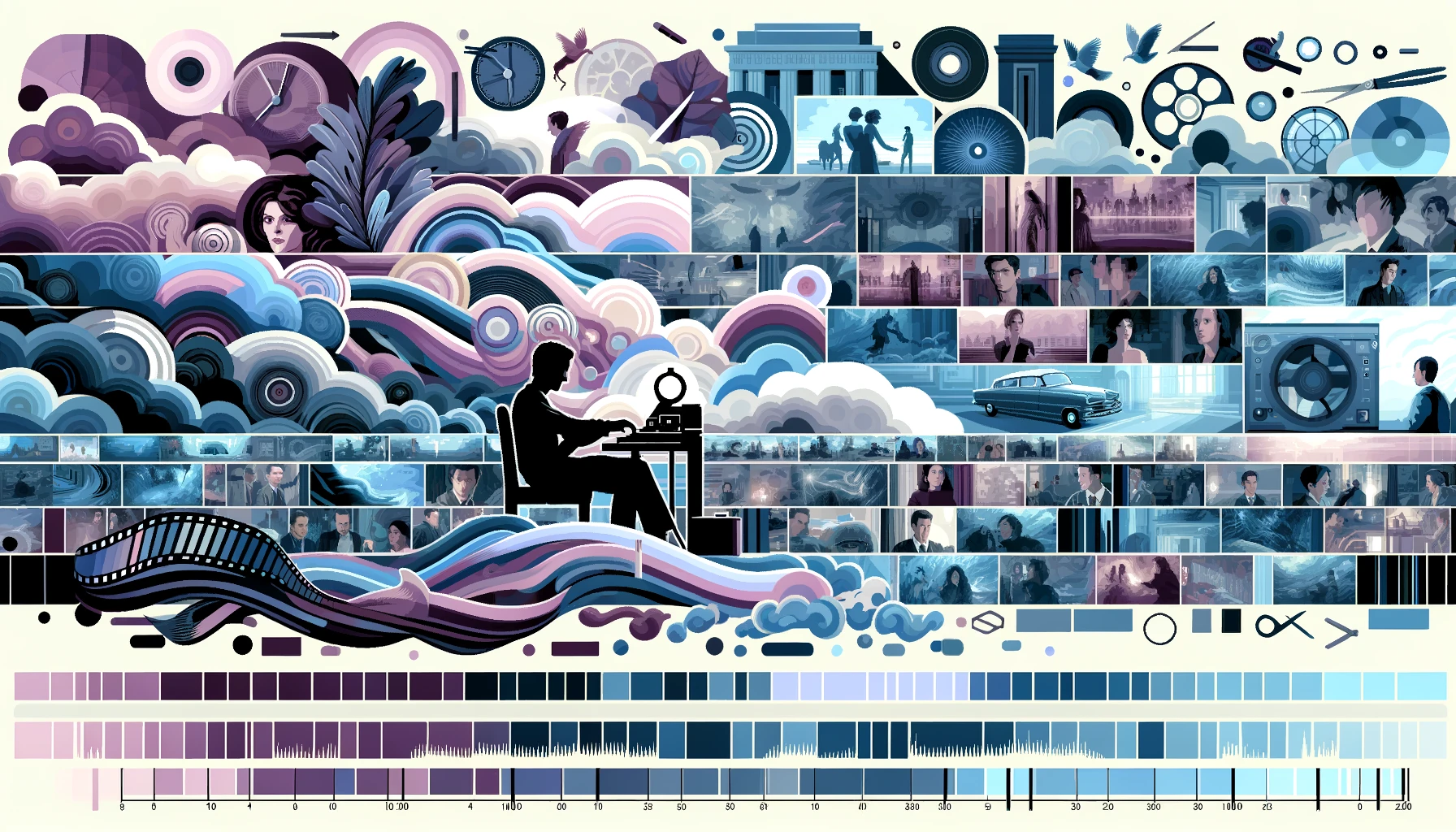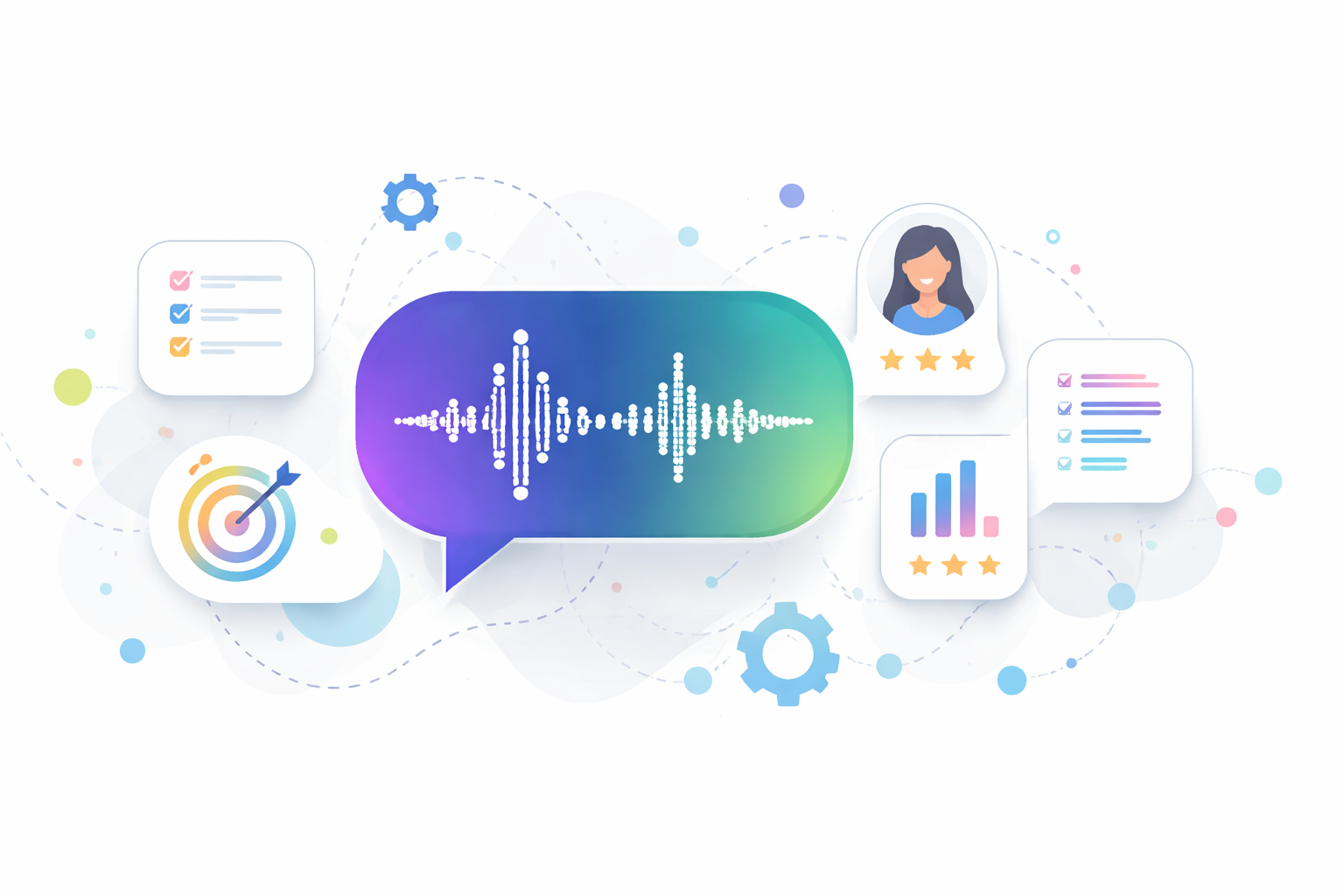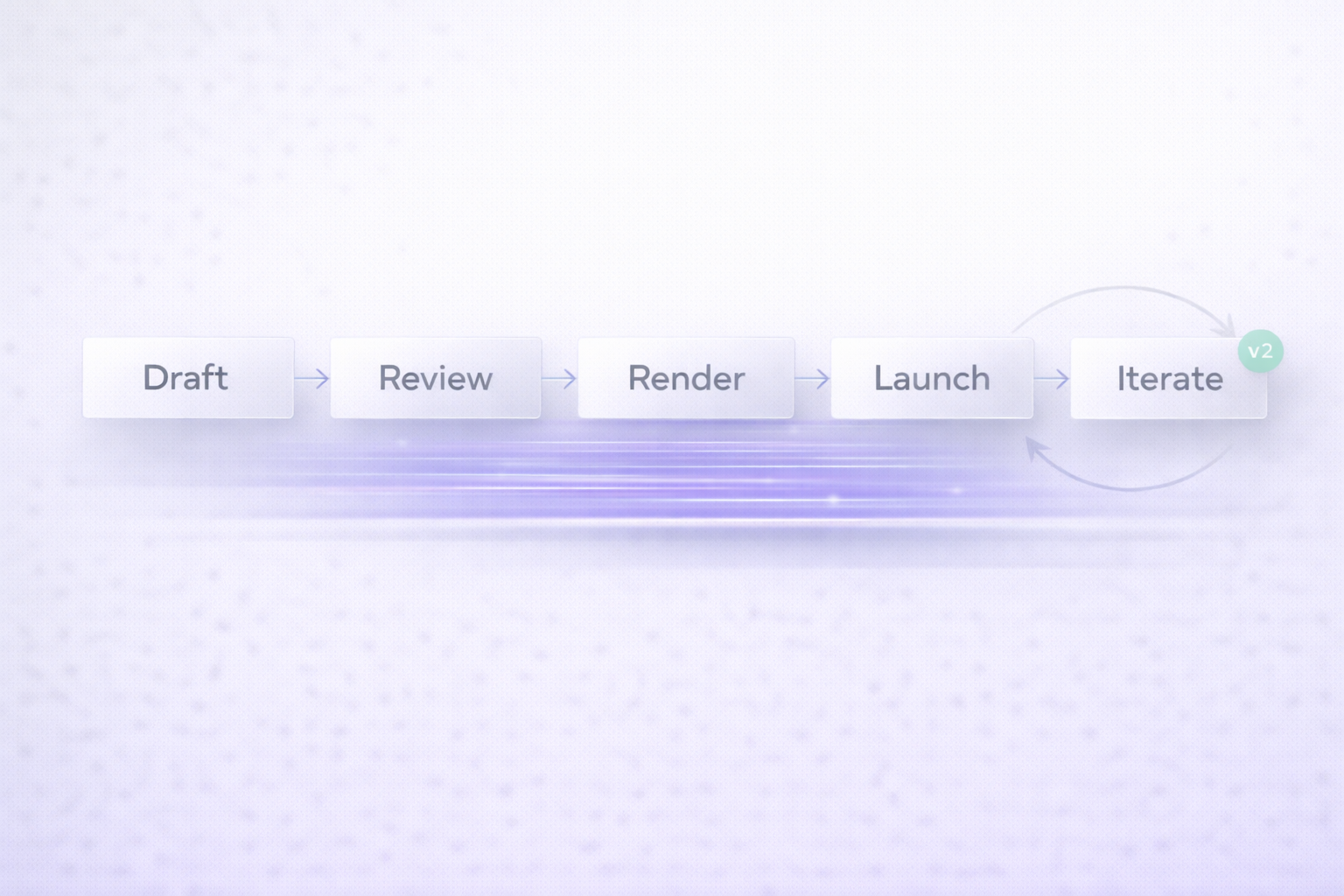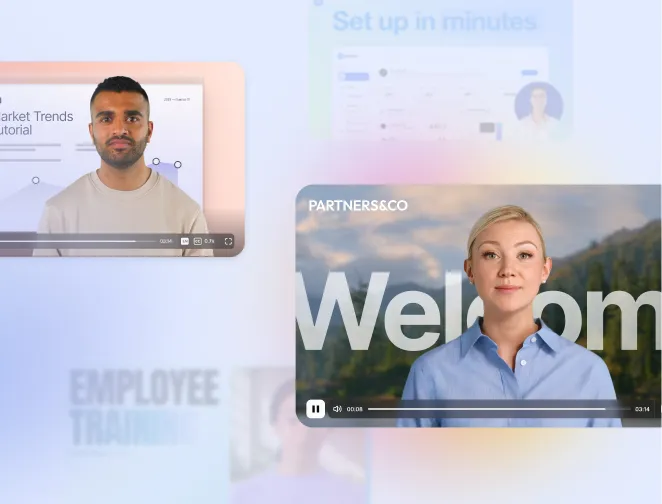Customer expectations are only getting higher. In the past year, 33% of consumers switched brands due to negative interactions. Put simply, people are no longer willing to wait for good service.
And that means customer service departments need to find new ways to respond faster and more accurately than ever. This is where AI in customer service can pay off big time.
Implementing AI streamlines service and supports human staff in creating a more intuitive experience for every customer. It works with your support team to improve customer retention.
An AI-powered customer service process offers automation, self-service resources, and a deeply personalized approach. From real-time sentiment analysis gauging customer satisfaction to predictive analytics anticipating customer needs, AI technologies enable you to engage with customers more meaningfully.
This blog post delves into AI's applications in customer service. Read on to see how artificial intelligence transforms operations and reimagines the essence of customer engagement and support.
How useful is AI in customer service?
AI technology eases the workload for support agents and improves the customer experience. The biggest outcome of AI in customer service is the efficient handling of large volumes of inquiries. The fact that it does it with automated and personalized responses and interactions is mind-blowing.
As AI bots enable 24/7 support across multiple channels, immediate assistance for basic queries is ensured.
So, AI frees human agents to handle more complex issues. Moreover, its capacity for learning from interactions leads to an improved ability to resolve problems over time. In short, it facilitates a more streamlined customer experience that only gets better with time.
How will AI impact customer service?
AI will set a new standard for customer service that prioritizes speed, accuracy, and personalization. Customer-facing employees will transition from performing repetitive tasks to focusing on strategic, creative, and complex problem-solving roles. Basically, AI in customer support will reshape the workforce and elevate the customer experience by:
- Handling routine inquiries in less time,
- Predicting customer needs before they arise,
- Offering proactive support and customized recommendations that reduce the need for human support,
- Creating increasingly sophisticated, empathetic interactions through natural language processing and emotional intelligence.
In the customer service industry, you can expect interactions to improve and customer expectations to rise. Check out how Barak Eilam, CEO of NICE (a customer experience AI platform), expects AI to impact customer service by facilitating mass personalization at scale:
Use 1: Speed up agent onboarding and training video creation
AI for customer service makes it faster and more cost-efficient to create onboarding and training videos for your service agents. It gives you a tool to train your support team at lightning speed.
Companies use AI to reflect new information or protocols. They automate the dissemination of consistent, engaging, and easily updatable training materials. This way, international customer service teams are well-prepared and knowledgeable. Therefore, communication delays between branches are minimal.
Text-to-video AI tools like Synthesia generate videos as diverse as your customer base in minutes. The videos are easily customizable and can be translated into multiple languages simultaneously. Plus, they feature AI avatars (digital doubles of real actors) reflecting multiple nationalities and increase accessibility with automated closed captions. They can even clone someone's voice or image (with their permission) to create training materials that learners will easily connect with.
Below is a screenshot from an interactive video quiz created with Synthesia and the authoring tool Articulate 360. Paige, the trainer you see in the picture, is an AI avatar:
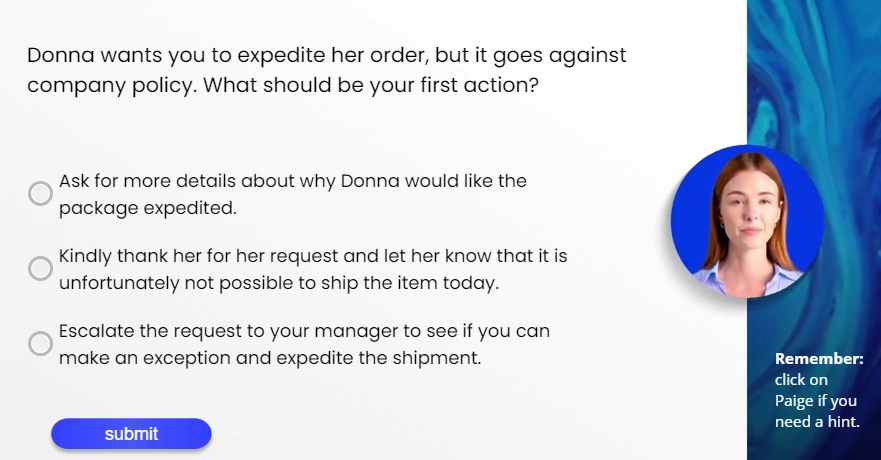
And here's the feedback she's giving learners who answer correctly:
Other useful tools that help with agent onboarding include:
- Chorus.ai: Conversation intelligence platform that analyzes sales calls. It can provide onboarding agents with real-world examples of effective communication and problem-solving tactics.
- Rasa.io: AI-driven platform that looks at an agent's interactions and progress. It automates their personalized learning emails.
- Seismic Learning: Learning and coaching software. It uses AI to provide personalized training paths and practice scenarios for customer service agents.
Use 2: Turn support knowledge base articles into engaging videos
Viewers retain 95% of a video's message compared to only 10% when reading text. Artificial intelligence tools that turn consistent support articles into videos make the information easier to digest. They also cater to varying learning preferences, making the knowledge base more universally accessible.
Next to Synthesia, Lumen 5 and Pictory use AI to generate videos from existing text content quickly and easily.
Here's a video example of this application of AI in customer service:
Videos surely demonstrate complex procedures or solutions in a straightforward, visual manner. Yet learners may feel the need to switch between environments depending on where they access them. That's why turning video into text with an AI tool like Otter.ai will make your documentation base more searchable. Otter transcribes videos in real-time, quickly turning resources like webinars into a comprehensive help desk.
Use 3: 24/7 AI chatbots for self-service FAQs
An AI customer service chatbot simulates a conversation with human users using Natural Language Processing and pre-defined logic rules. Adding 24/7 AI chatbot support for the most frequent customer questions can:
- Greatly reduce the number of requests that human customer service teams handle.
- Help customers get the answers they need with minimal delay.
AI-powered chatbots give instant self-service resources. They answer frequently asked questions at any time and allow support teams to focus on more complex issues requiring a personal touch.
To deploy such AI-powered solutions, businesses typically integrate a 24/7 AI chatbot into their websites, social media platforms, and customer service portals.
The chatbots use natural language processing (NLP) to understand and respond to customer queries conversationally. They can be trained on a company's knowledge base, ensuring accurate and relevant responses. And over time, machine learning capabilities enable these chatbots to learn from interactions, resolving queries more effectively.
A few examples of AI chatbot platforms that enhance customer service include Intercom, Drift (for both sales and marketing), Ultimate.ai (integrates ChatGPT), and Ada (specifically designed for enterprise businesses).
Use 4: Automate and direct client inquiries with IVR and custom requests
Interactive Voice Response (IVR) is the pre-recorded menu that plays when a customer calls a support center. For companies, it's a big helper that frees up human resources and increases agent productivity. But there's one big problem with IVR — people don't really like them. And AI can make them more likable, creating a fresh perspective on this old problem.
The main issue with pre-recorded IVR is that it lacks personalization. But with natural language understanding and AI-generated responses, you can upgrade to a more customer-centric approach.
These systems intelligently route calls based on the customer's specific needs. They resolve simple queries without human intervention, streamlining the customer experience. Automation quickly connects customers with the appropriate department or agent who can effectively address their concerns. In short, wait times go down, and satisfaction goes up.
If you already have IVR in place, check out how Twilio provides flexible APIs for building advanced IVR internal systems. It can automate call flows, handle custom requests, and integrate with CRM systems for personalized customer interactions. Alternatively, Genesys offers broader customer experience solutions, including powerful IVR capabilities that use AI to understand and predict customer intent.
Use 5: Tailor customer interactions based on history data and behavior
AI customer support software uses machine learning (ML) and predictive analytics to sift through existing customers' data (like transaction history, website visits, and social media engagement) and:
- Understand behaviors and preferences,
- Identify patterns that inform segmentation,
- Predict customer issues before they arise,
- Help service professionals offer personalized experiences.
ML models are trained on data to refine predictions. Based on the patterns they discover, they'll personalize marketing messages, product recommendations, and proactive issue resolutions. The result is delivering experiences that feel tailor-made and improve buyer satisfaction.
Using Salesforce's CRM platform gives companies access to Salesforce Einstein. This is an integrated AI layer that provides predictive insights and recommendations directly into the customer management process.
A similar application of AI in customer service comes from the Google Cloud AI platform. Google offers a suite of ML and analytics tools for analyzing consumer data and developing custom models that predict customer behavior.
Use 6: Gauge customer satisfaction with sentiment analysis
Sentiment analysis tools interpret and measure the emotions and opinions expressed in customer interactions and feedback. They predate the rise of big AI platforms like ChatGPT and are continuously evolving to quickly understand mood, identify potential issues, and address issues proactively.
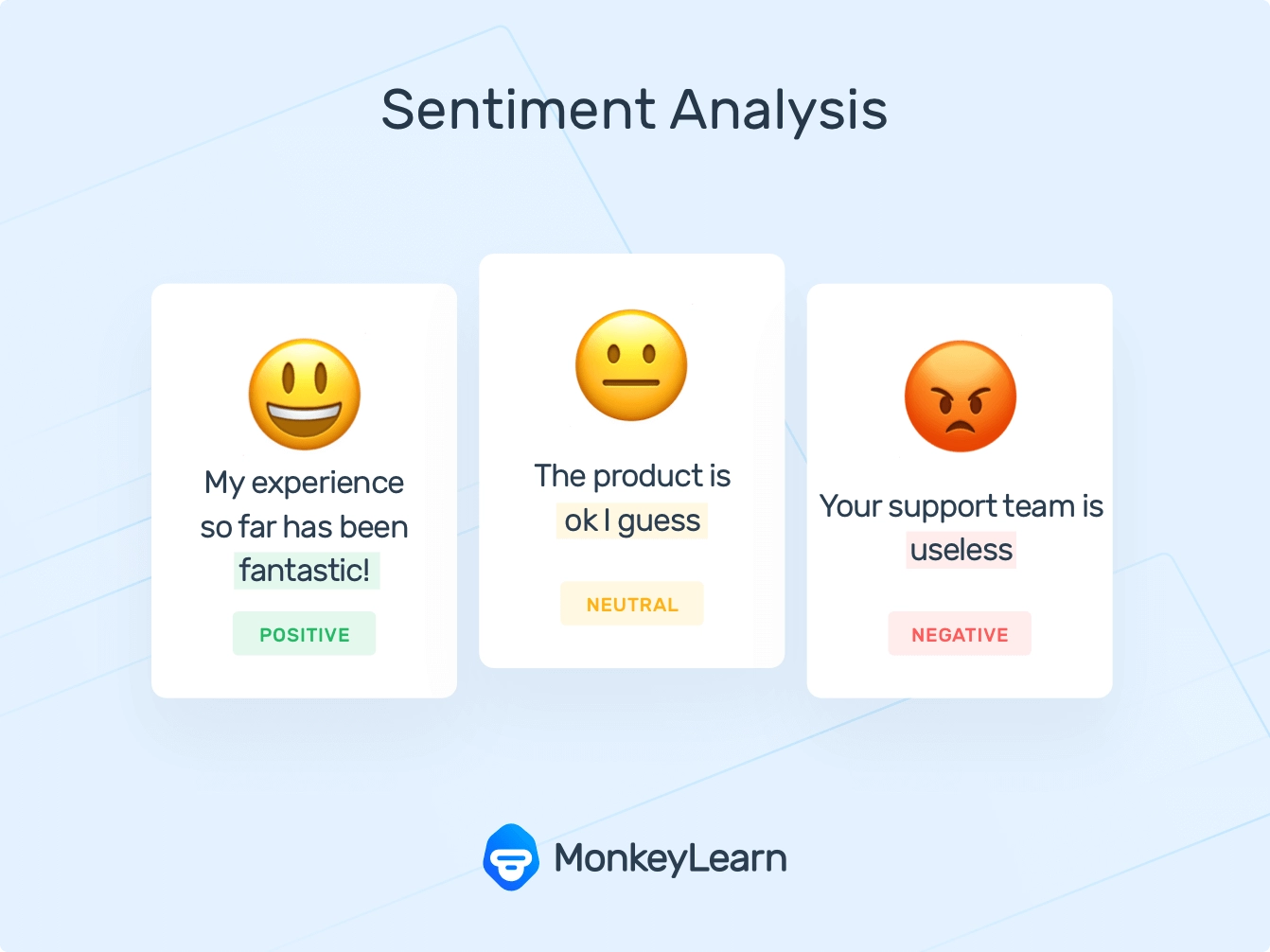
This analysis can be applied across various channels, including social media, customer support interactions, and product reviews, providing a comprehensive view of the customers' satisfaction.
Implementing this technology for real-time analysis requires integrating AI tools into your customer interaction platforms.
Want to use this form of AI for customer service? IBM Watson offers AI-powered solutions to identify and categorize emotions in text. It helps businesses understand customer sentiment across multiple channels. Alternatively, the Google Cloud Natural Language API and Microsoft Azure Text Analytics include sentiment mining as part of their wider suite of tools.
And if you have written feedback from your customers, you can get a quick analysis of customer sentiments even from ChatGPT.
Use 7: Track, analyze, and improve customer journeys
A customer service team can use artificial intelligence to map the customer journey more accurately. These insights typically reveal friction points, opportunities for engagement, and details about customer behavior and preferences. They power up a consistent service that meets and exceeds expectations, increasing customer retention.
But here's how it actually works. Artificial intelligence tools collect and analyze data from website interactions, social media engagement, purchase history, customer support interactions, etc. Then, they process it with ML algorithms to identify patterns, predict future actions, and recommend improvements to the customer experience.
This particular application of AI in customer service helps create a seamless, personalized experience. Its goal is to meet the customer's needs at each stage of their journey, increasing satisfaction and conversion rates.
Some AI platforms and services that help in optimizing customer journeys include:
- Zoho CRM: Its AI assistant, Zia, helps businesses manage customer relationships more effectively. Zia is an AI solution that predicts sales trends, suggests the best times to contact prospects, and assists with managing the overall sales process, making it easier to tailor the customer journey.
- Hotjar: Uses an AI tool to instantly create and analyze surveys that get you insights fast.
Use 8: Anticipate customer requests with predictive analytics
This type of analytics uses data, statistical algorithms, and machine learning techniques to identify the likelihood of future outcomes based on historical data. By analyzing patterns in customer history and behavior, service usage, interactions, etc., companies can predict what customers are likely to need next and offer solutions or products before they ask for them.
For instance, Zendesk Explore offers analytics for customer inquiries and interactions, allowing businesses to anticipate needs and trends by analyzing support tickets and engagement patterns.
Use 9: Engage customers with personalized bot recommendations
Bots use NLP and ML to look at buyer data (past purchases, browsing history, preferences, etc.) and engage returning customers with personalized recommendations. The interaction may happen on your website, social media platforms, or messaging apps. But it always results in tailored suggestions that resonate with individual customer needs and interests.
This specific use is the equivalent of the in-store customer service professional. Instead of a human agent, however, you use AI to provide instant support. Here's how a bot would interact with Emily, a customer who returns to an online shop to buy a dress for an upcoming event. 👇
"Welcome back, Emily! Looking for something special for an event?"
"Yes, I need a dress for a wedding."
"What's the wedding theme? Do you prefer a specific color?"
"It's a beach wedding, and I love blue."
The bot uses its algorithm to sift through the inventory and presents a selection of blue dresses suitable for beach weddings.
"Would you like to see accessories that match your dress choice?"
Emily agrees, and the bot showcases a selection of accessories, including jewelry and sandals that complement the beach wedding theme. It also suggests her to try on virtually using AR (Augmented Reality), reminds her of the store's return policy, and offers to assist with size selection based on her past purchase sizes.
Some tools that could help you provide this type of AI in customer service include:
- ManyChat: A platform for automating interactive conversations on messaging apps. Its bots can be programmed to deliver personalized product recommendations to customers based on their interaction history and preferences.
- Intercom: Offers a chatbot for proactive customer engagement. Intercom's bots can be customized to suggest products, services, or content, providing a tailored experience based on historical data.
- Drift: Specializes in conversational marketing and sales bots. Its platform can be used to engage website visitors with personalized recommendations, enhancing the chances of conversion by showing customers exactly what they're likely to be interested in.
- Chatfuel: Provides a platform for building Facebook Messenger bots that offer personalized interactions. Chatfuel bots use customer data to make customized recommendations, improving engagement directly on social media.
Create an AI customer service video in minutes
Your competitors are only one mouse click away. But with a bit of help from artificial intelligence, you can implement a customer support process that will attract customers like a magnet.
You don't even have to implement all the uses of AI in customer service at once. Instead, begin making your services stand out with professional-looking, customized AI videos. Create videos in any language to educate, entertain, and persuade people to buy or reach out to your agents for further assistance.
You can do all that using just your web browser!
Use Synthesia's free AI video generator to create an AI video — no credit card is required.
About the author
Content Writer & Marketing Expert
Ema Lukan
Ema Lukan is a seasoned Content Writer and Marketing Expert with a rich history of collaborating with marketing agencies, SaaS companies, and film studios. Her skill set encompasses copywriting, content creation, and a profound understanding of the intricate fabric of brand identity. Ema distinguishes herself not merely as a wordsmith but as a storyteller who comprehends the power of narratives in the digital landscape. Fascinated by new technologies, she navigates the evolving marketing terrain with creativity and analytical precision, leveraging data to refine strategies. Her passion lies in crafting compelling stories that resonate, always mindful of the ever-changing dynamics in the digital world and the culture shaping it.








